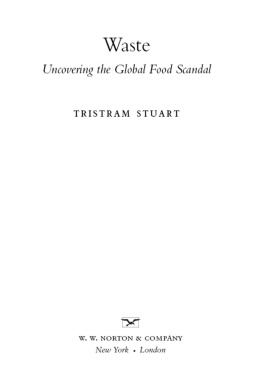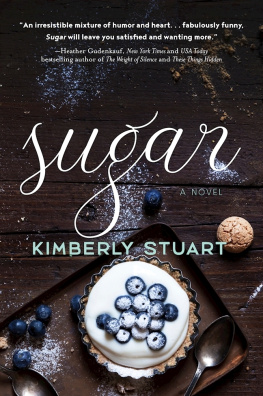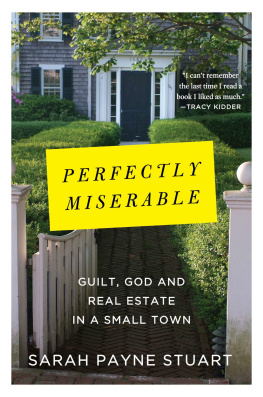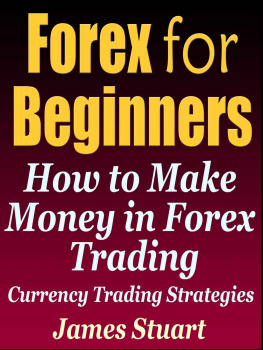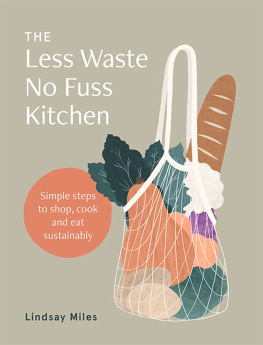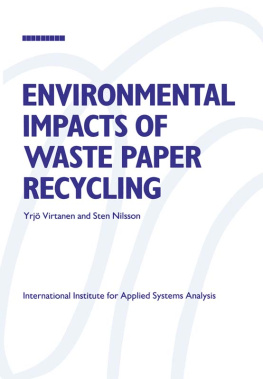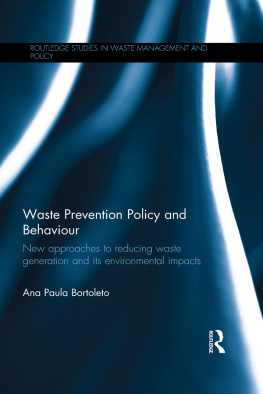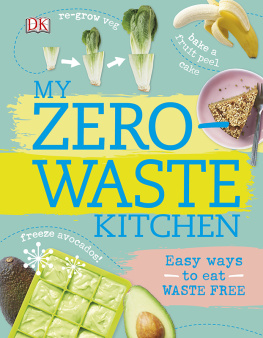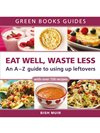Waste
Uncovering the Global Food Scandal
TRISTRAM STUART

W. W. NORTON & COMPANY
New York London
Copyright 2009 by Tristram Stuart
First American Edition 2009
All rights reserved
For information about permission to reproduce selections from this book, write to Permissions, W. W. Norton & Company, Inc., 500 Fifth Avenue, New York, NY 10110
Library of Congress Cataloging-in-Publication Data
Stuart, Tristram.
Waste: uncovering the global food scandal / Tristram
Stuart.1st American ed.
p. cm.
Includes bibliographical references.
ISBN: 978-0-393-07735-3
1. Food industry and
tradeWaste minimization. 2. Food industry and tradeWaste disposal. 3. Recycling (Waste, etc.) I. Title.
TD899.F585S78 2009
363.8dc22 2009030964
W. W. Norton & Company, Inc.
500 Fifth Avenue, New York, N.Y. 10110
www.wwnorton.com
W. W. Norton & Company Ltd.
Castle House, 75/76 Wells Street, London W1T 3QT
In Memory of Gudrun
Contents
PART I:
Perishing Possessions
PART II:
Squandered Harvests
PART III:
Where Theres Muck Theres Brass
List of Illustrations
Unless otherwise stated, all photographs are by the author.
- 1 The contents of the bins outside a village shop, Sussex, England, October 2008
- 2a The contents of the bins of an organic fruit and vegetable shop, Sussex, England, October 2006
- 2b The contents of the bins of a village Co-op store, Sussex, England, 8 September 2008
- 3a The contents of the bins of a Marks & Spencer supermarket, central London, England, April 2009. Photograph by Phillip Birch, Penguin Books
- 3b A selection of fresh produce from the bins of a Waitrose town supermarket, England, July 2008
- 4 Hain Celestial Group sandwich factory, suppliers of Marks & Spencer sandwiches. Photographs by Simon Inglethorpe, March 2009
- 5 Pastry trimmings in the Ginsters cornish pasty factory, Cornwall, England, August 2008
- 6a Richard Hirst with his crop of spinach, rejected by the retailers and left to rot in the field, summer 2008. Photograph by Laura Yates
- 6b Potatoes rejected for cosmetic reasons at a potato farm that supplies Tesco. Kent, England, 2008
- 7a Surplus Canary tomatoes dumped on farmland in Tenerife, 1993. Sally A. Morgan; Ecoscene/CORBIS
- 7b Surplus oranges, California, USA. Roger Ressmeyer/ CORBIS, 25 March, 1981
- 8 Thousands of bananas dumped in ditch by United Fruit, Rio Estrella, Costa Rica, 1993. Gary Braasch/CORBIS
- 9a Cider-pressing in Sussex, England, October 2008. Photograph by Adrian Leaman
- 9b The Tale of Three Lettuces, summer 2008
- 10a Sheeps organs in Kashgar, China, April 2008
- 10b Chicken feet and pigs trotters in China, May 2008
- 11a Animal by-products maturation heap, England. Photograph by Robert Persey
- 11b Fish being discarded on an industrial trawler. Photograph by Lionel Flageul
- 12 We Want Your Kitchen Waste , by John Gilroy, c.193945. Ministry of Food (UK). Image supplied by TopFoto
- 13 A clear plate means a clear conscience , by James Fitton. Printed for HM Stationery Office by Wm Brown and Co., Ltd., London, c.193945. 745 mm x 488 mm. Lithograph on paper. Image supplied by TopFoto
- 14a Dont Waste Bread! Save Two Slices Every Day. Ministry of Food (UK), 1917, Clarke and Sherwell Ltd Printers, London. 764 mm x 508 mm. Lithograph on paper, artist unknown. Image supplied by The Advertising Archives
- 14b Dont Waste Food While Others Starve! United States Food Administration, L. C. Clinker and M.J. Dwyer, c.191418. Corbis
- 15a Agri Gaia System Co. Ltd, Sakura city, Chiba province, Japan. Everett Kennedy Brown/Corbis, 29 February, 2008
- 15b Municipal food waste collected for composting and pig feed, Seoul, South Korea, June 2008
- 16a Food waste for pig feed at the Odakyu Food Ecology Centre, Sagamihara city, near Tokyo, Japan, June 2008
- 16b Kamei-san and his pigs, near the Odakyu Food Ecology Centre, Sagamihara city, Japan, June 2008
Acknowledgements
Thanks to my editor at Penguin, Stuart Proffitt, for his astounding meticulousness and enthusiasm, and to Phillip Birch, who made innumerable astute contributions and to Mark Handsley; also to Bob Weil at Norton and my agent, David Godwin, ever irrepressible and supportive. Andrew Parry, Mark Barthel and Keith James at the Waste & Resources Action Programme (WRAP) gave me access to data and insight and kindly took up much of their precious time reading an early draft of the manuscript, saving me from mistakes and sharpening insights and policy recommendations. Tim Lang and Tara Garnett generously agreed to read drafts and provided me with invaluable feedback. I am extremely grateful to all of them, but equally, any errors are mine alone, and the stated opinions are not necessarily shared by them.
I was taken aback by the willingness of some individuals within the food industry to co-operate, including Alison Austin, Gus Atri, James Cherry, Julian Walker Palin, Kev Stevenson, Mark Bartlett, Rowland Hill, Maureen Raphael, Takeshi Tanami, Toshiro Miyoshi, Kouichi Takahashi and Hiroyuki Yakou. A special thanks to Lord Chris Haskins who has been feeding me ideas and honing my understanding of the global food industry for years.
Technical assistance with my calculations and questions of scientific method was selflessly and unstintingly provided by Jannick Schmidt, Jo Howes, Randi Dalgaard and Vaclav Smil. Many other valued suggestions came from academics, friends and other individuals. I am particularly grateful to Adrien Assous, Robyn Kimber, Peter Jones, Marion Nestle, Akifumi Ogino, Tomoyuki Kawashima, Karoline Schacht, Eric Evans, Michael Mann, Eric Audsley, Hyunook Kim, James Parsons, Cinzia Cerri, Sung-Heon Chung, David Jukes, Keith Waldron, Faqir Mohammad, Belinda Fletcher, Jean Buzby, Itisaki Shimadu, Frank Filardo, Thomas Stuart, Deborah Stuart, Alex Evans, Jack Mathers, Ricardo Sibrian, Daniel Wilson, Michael Chesshire, Ozunimi Iti, Nicola Kohn, Timothy Jones, Catherine Gaillochet and Shahin Rahimifard.
I was blessed with dedicated research assistants, Laura Yates and Simon Inglethorpe, who among many other things crunched thousands of statistics from various sources: the result of much of their work is concentrated in the appendix, where raw data has been converted into stunning maps, charts and tables through the work of Alan Gilliland. In South Korea, Japan and India I received diligent help from Tehion Kim, Haruka Ezaki and Arshinder Kaur.
Crucial doses of hospitality while researching the book came from Declan Walsh, John, Louise and Rose Dargue, Zainab Dar, Usman and Hussain Qazi, and the Kawasaki family. Above all I have to thank my wife, Alice Albinia, whose careful editing, drafting and unending patience made the book possible.
But if they perished, in his possession, without their due use; if the fruits rotted, or the venison putrified, before he could spend it, he offended against the common law of nature, and was liable to be punishedif either the grass of his enclosure rotted on the ground, or the fruit of his planting perished without gathering, and laying up, this part of the earth, notwithstanding his enclosure, was still to be looked on as waste, and might be the possession of any otherHe was only to look, that he used them before they spoiled, else he took more than his share, and robbed others. And indeed it was a foolish thing, as well as dishonest, to hoard up more than he could make use of. If he gave away a part to any body else, so that it perished not uselesly in his possession, these he also made use of. And if he also bartered away plums, that would have rotted in a week, for nuts that would last good for his eating a whole year, he did no injury; he wasted not the common stock; destroyed no part of the portion of goods that belonged to others, so long as nothing perished uselesly in his handsthe exceeding of the bounds of his just property not lying in the largeness of his possession, but the perishing of any thing uselesly in it.

